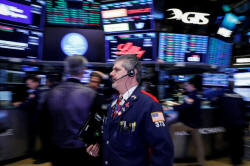U.S. stocks suffer massive outflows as Trump risks trade
war: BAML
 Send a link to a friend
Send a link to a friend
 [March 09, 2018]
By Helen Reid [March 09, 2018]
By Helen Reid
LONDON (Reuters) - A marked shift toward
protectionism by President Donald Trump caused sharp outflows from U.S.
large-cap stocks this week, Bank of America Merrill-Lynch (BAML)
strategists said on Friday.
Investors rushed into government bonds and other safer assets amid
rising fears of an international trade war after Trump's plans for
tariffs on imported steel and aluminum met barbed responses from allies
and trade bodies.
Overall, investors pulled money out of equities, though the damage was
mostly in the United States where $10.3 billion flowed out of U.S.
equity funds, while global equity funds suffered just $0.4 billion of
outflows, according to EPFR data cited by BAML.
"As QE ends, protectionism begins," wrote BAML strategists.
The risk-off mood drove investors into money market funds, pushing
assets up to $2.9 trillion - the highest level since 2010. Safe-haven
gold also drew in $0.4 billion.

U.S. small caps were sheltered from the storm, the only U.S. sector to
draw inflows, albeit tiny at $0.03 billion. U.S. large-cap stocks lost
$10.1 billion.
Flows into Japanese equities continued apace, with the market drawing in
$4.1 billion in its 14th straight week of inflows, the longest streak of
inflows since 2013. European stock funds managed to draw in $0.1
billion.
Trump's exemption of Canada and Mexico from the final tariffs announced
late on Thursday soothed investors somewhat, and news the U.S. president
would meet with North Korean President Kim Jong Un caused crude prices
to rise.
"US-DPRK detente suggests protectionism can remain at "bark" not "bite"
stage," argued strategists.
Among large economies, China has the highest dependency on exports to
the United States and therefore looks the most vulnerable to U.S.
protectionism.
The Hong Kong dollar is the "ultimate China-U.S. trade war play", said
BAML. Hong Kong is firmly in the crosshairs of any potential trade war
as its currency is pegged to the U.S. dollar but its economy is highly
reliant on China.
[to top of second column] |

Traders work on the floor of the New York Stock Exchange, (NYSE) in
New York, U.S., March 8, 2018. REUTERS/Brendan McDermid

The Hong Kong dollar has sunk since Trump's tariff talk began and hit a fresh
33-year low <HKD=D3> on Friday.
BULL-BEAR DOWN TO 6.8 AS CREDIT MARKETS FALTER
The approaching prospect of an end to quantitative easing also caused outflows
from rate-sensitive credit markets, driving BAML's "Bull & Bear" indicator of
market sentiment down to 6.8, down from 7.6 in the previous week. The
indicator's 10-point scale ranges from most bearish at zero to most bullish at
10.
By year-end U.S. Federal Reserve, European Central Bank and Bank of Japan asset
purchases will turn negative year-on-year, strategists pointed out.
High-yield outflows are accelerating - with redemptions for eight straight weeks
- while investment grade inflows are losing momentum.
One constant through the market turmoil has been the tech sector.
Global tech funds did slip last week, losing $0.2 billion, but have drawn in
record inflows of $42 billion so far this year, even though the market cap of
U.S. tech stocks already dwarfs the combined market cap of emerging markets' and
euro zone equities.
The prospect of rising rates has also revived interest in financials, whose
profit margins are set to gain, and global financials drew $1 billion of inflows
this week.
Active management continued its comeback: actively managed funds saw their
biggest inflows year-to-date since 2013.
(Reporting by Helen Reid; Editing by Susan Fenton)
[© 2018 Thomson Reuters. All rights
reserved.] Copyright 2018 Reuters. All rights reserved. This material may not be published,
broadcast, rewritten or redistributed.
Thompson Reuters is solely responsible for this content.
 |